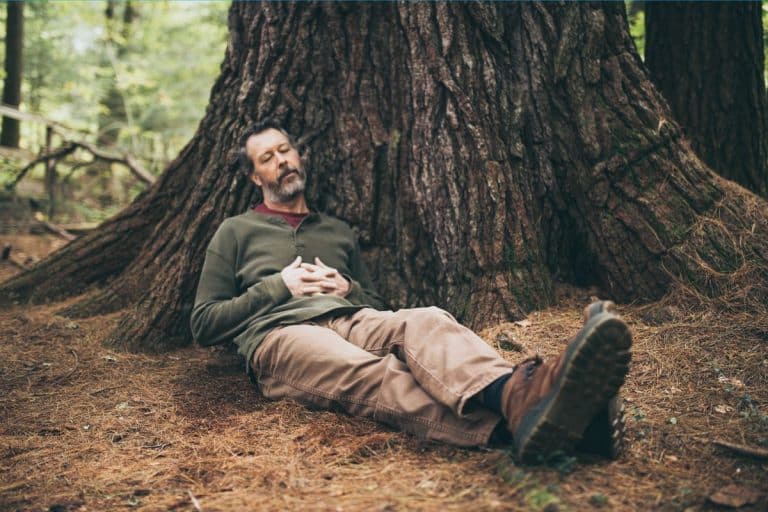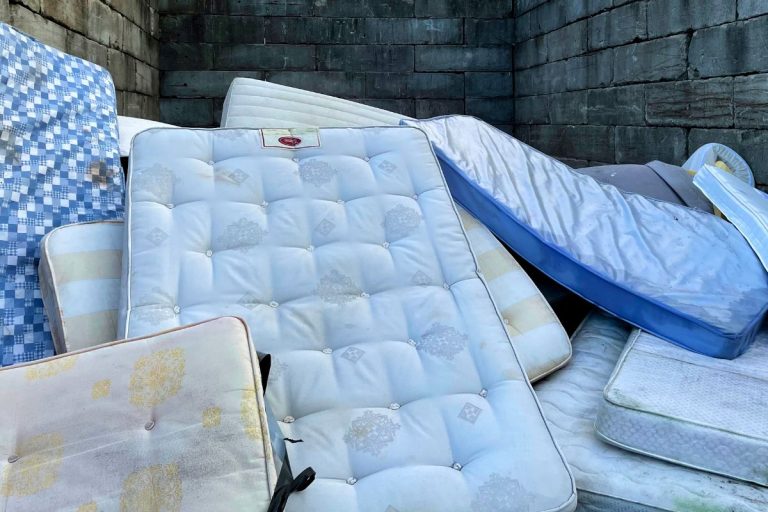Your first sleepwalking experience is not something you are bound to forget any time soon.
You wake up in a completely different location from where you went to bed. For some reason, you have a bag full of your garden tools or stacked all of your kid’s toys in a pile. And then you begin to wonder when you turned into a werewolf.
The good news is that sleepwalking isn’t inherently harmful (we can’t say the same for werewolfing.)
Also, sleepwalking episodes are typically few and far between. A large percentage of people will experience sleepwalking at least a couple of times in their lifetime. Hence, one or two random occurrences of sleepwalking isn’t a cause for concern.
Note:
Sleepwalking (known medically as somnambulism) has no formal medical diagnosis. Sleepwalking becomes a problem when an underlying condition exists that triggers the episode, and physicians can only target that basal issue.
By definition, the defining attribute of sleepwalkers is that they wander from the bed during sleep. However, sleepwalking episodes can also extend to include more complex activities like talking, performing repeated motions, eating, or even driving a car.
Sleepwalking episodes can last for anywhere from a few seconds to as long as 30 minutes
If you or a family member sleepwalks once or twice, it probably isn’t a big deal. However, if they experience recurrent sleepwalking episodes, you should take applying the tips in this article to help mitigate it and also bring the issue up with your healthcare practitioner.
There’s no formal diagnosis for sleepwalking itself. Nevertheless, your physician may consider running tests to identify any underlying conditions.
If you or a partner begins to sleepwalk regularly, you should seriously consider taking measures to prevent future sleepwalking episodes.
Why We Sleepwalk
While sleepwalking is not intrinsically harmful, during sleepwalking episodes, the sleeper can be put in harm’s way or even pose the risk of harming others. Hence, preventing persistent sleepwalking can be critical to the safety of both the sleeper and their family.
The first step to averting sleepwalking episodes is understanding why we sleepwalk.
Poor Sleep and Inconstant Sleep Schedules
A significant percentage of all sleepwalking episodes stem from the brain’s reaction to an erratic sleep schedule or poor sleep in general. Consequently, several factors that can disturb sleep and cause sleeping problems can sometimes trigger sleepwalking.
Some of these potential sleepwalking triggers include:
- Stress
- Inadequate sleep
- Over exhaustion
- Noisy sleep environment (Check How Does Noise Affect Sleep?)
- Travel and change of environment
- Illnesses/infections with a fever (Check 11 Ways to Sleep When You Have a Cold)
- Reaction to medication like sedatives and antihistamines
- Use of stimulants and recreational drugs
- Alcohol abuse
- Sleeping with a full bladder
- A family history of sleepwalking
On the other hand, sleepwalking can also stem from a host of other underlying medical conditions like:
- Sleep apnea and other breathing-related sleep disorders
- Head trauma
- Gastroesophageal reflux disease (GERD)
- Hyperthyroidism
- Narcolepsy
- Migraines
- Stroke
Kids are significantly more likely to experience sleepwalking episodes than adults. Experts consider sleepwalking a relatively standard part of brain development, especially amongst children in the 8-12 year age range.
According to the American Academy of Sleep Science, almost 20% of all kids sleepwalk at least once before they hit their teens. On the other hand, only 4% of adults will have some sleepwalking experience during their lifetime.
How to Prevent Sleepwalking
Since sleepwalking is not technically a medical problem, you can not treat or prevent it directly.
Whether you are dealing with sudden onset of sleepwalking, experiencing recurrent sleepwalking episodes, or have had this problem all your life and need a solution, your best bet is to tackle the underlying triggers that are creating the issue.
Deal With Stress
A common thread among many adults who experience the onset of sleepwalking episodes later in life is that they often link the start to a stressful or anxious period.
If you fall into this category, you should consider prioritizing your mental health, as this problem could be a foreboding of things to come if you don’t change things up.
There is an abundance of techniques and lifestyle practices you can incorporate into your routine to help you live a less anxious and stressful life. However, sometimes, the solution to the problem is simply taking control and taking on less or better workloads and managing your time more efficiently.
Other approaching to reducing stress and anxiety you can try include:
- Relaxation techniques like stretching, yoga, and self-hypnosis
- Meditation
- Physical activity and exercise
- Sex
- Therapy and conversations with friends or colleagues
- Quitting the use of stimulants like caffeine, nicotine, and alcohol
Clear Your Head
Many sleepwalkers report that they face a significantly higher risk of sleepwalking on nights where they have pressing matters on their mind before hitting the sack.
In reality, some sleepwalkers even admit that their sleepwalking episodes end up being a manifestation of the last thought they remember having before going to bed on the previous night.
For example, you might have a persistent worrying thought about not walking the dog that day, then wake up to find your unconscious self trying—and often failing, the task.
To avoid this issue, ensure you clear your head to the best of your ability before calling it a day.
Have a task that’s on your mind around bedtime? If it’s a small one, get it done so you can sleep without the stress. Turn off the lights, go brush your teeth, go tell your kids good night—enter your bedroom with a clean slate.
On the other hand, if you are dealing with tasks that are too large to deal with, consider writing them out on paper before sleeping. The same applies to worrying trains of thought and ideas.
Writing can often help you unburden your mind and increase your chance of smoother relaxation.
Keep a Sleep Diary
One of the best things you can do if you are dealing with recurrent sleepwalking episodes is to start keeping a sleep diary. In this case, a sleep diary records activities around your sleep schedule, including the duration of and the actions that occurred in each sleepwalking episode.
A sleep diary for sleepwalking should also cover information like the type of food and drinks you consumed that night and any other events, life situations, or habits that may be of consequence.
Also, it can be significantly beneficial to enlist the help of a partner to help observe you when you are unconscious.
Look for patterns.
After a few nights of observation, the chances are that you will notice a trend. Maybe you drank too much alcohol that night, you went to bed with a half-full bladder, or sleepwalking only strikes when you bring home an unfinished assignment from the office.
Once you figure out the potential trigger, isolating, and preempting, it becomes significantly easier to manage.
Make Your Bedroom Distraction-Free
Sometimes, sleepwalking episodes can stem from unassuming triggers like a jarring noise that abruptly disrupts the sleeper during the night.
To avoid this issue, you should ensure to make the bedroom as distraction-free as you can. Cut out pets, children, noising electronics, and other items that may disrupt your sleep and possibly trigger sleepwalking.
You can even take things a step further by incorporating earplugs into your sleep schedule or adding a white noise machine to your bedroom to help drown any unexpected sounds or background noise.
Consider Anticipatory Awakenings
For children, anticipatory awakening can be an excellent short term solution that helps prevent sleepwalking.
Anticipatory awakenings involve waking the child about 20 minutes before the typical timing of their sleepwalking episodes, keeping them up through the expected duration of the event, and then allowing them to return to sleep afterward.
While the parameters of sleepwalking can vary from sleeper to sleeper, for most people, sleepwalking will occur within the first two hours of sleep. With some days of observation with a sleep diary, you can often zero in further on your prediction of when sleepwalking episodes will occur.
Getting Your Sleep Right
A lot of the triggers of sleepwalking boil down to problems with sleep. Hence, one of the most effective ways to prevent future episodes is often to ensure you are getting enough quality sleep.
You can fix two of the most common sleepwalking triggers—sleep deprivation and fatigue, by merely logging more sleep time.
However, getting your sleep right goes beyond getting the recommended 7-9 hours of rest each night. It is also essential that you get your sleep hygiene in check. Good sleep hygiene encompasses all of the steps you can take to optimize your sleep environment, improve your comfort levels, and boost your chance of getting adequately reinvigorating sleep.
Some ways to instantly improve your sleep hygiene include:
- Sticking to a regular sleep schedule
- Keeping your bedroom dark with blackout curtains
- Keeping the bedroom at cool 60-65 degrees
- Exercising often
- Setting a relaxing nighttime routine
- Cutting electronic devices out of the bedroom
- Avoiding the use of blue-light-emitting gadgets too close to bedtime
- Getting enough exposure to natural light during the day
- Avoid large meals and stimulants like coffee in the evening
- Investing in a comfortable mattress
Medical Intervention
While you can’t treat sleepwalking directly, sometimes, it is apt to seek medical intervention.
Consider consulting with your healthcare professional if:
- Sleepwalking occurs consistently
- The sleepwalker is at risk of hurting themselves or other family members
- The sleepwalker experiences extreme fatigue in the daytime
- Lifestyle changes do not affect the condition
- The sleepwalking stems from an underlying sleep disorder or other medical condition
Depending on the specifics of the case, a physician may recommend medications like sedatives to improve sleep. Doctors may also recommend anticonvulsants to help calm the brain, prevent panic attacks, and treat seizures, or antidepressants to help deal with anxiety, depression, and other mood disorders.
However, if the underlying problem is a medical condition or sleep disorder like sleep apnea and acid reflux, the best bet is to directly tackle that issue.
Keeping a Sleepwalker Safe
While sleepwalking is not inherently dangerous, the sleeper moves around unconsciously and can put themselves or others in harm’s way.
If you have a partner or other family member that is dealing with sleepwalking, here are some safety precautions you should consider to limit their risk of self-harm or even constituting harm to others.
- Keep sharp items and other dangerous items far from reach in secure drawers or cabinets
- Lock and bolt all doors and windows to keep the sleepwalker indoors
- Declutter their sleeping space to minimize the risk of tripping
- Keep car keys and other critical items in secure locations
- Keep the sleepwalkers away from bunk beds and other raised platforms
Another essential tip you should consider is to avoid waking the sleepwalker. Attempting to wake them can leave them startled or distraught, increasing the risk of harming themselves or others.
The best course of action is to gently guide them back to bed while offering calming and reassuring statements.
More Sleepwalking FAQs
Can Waking a Sleepwalker be Dangerous?
Contrary to the popular urban legend, interrupting a sleepwalker’s episode will not cause their demise. However, while sleepwalking, sleepers can be particularly hard to wake, and trying can leave them disoriented, increasing the risk of injury.
Can Sleepwalkers see you?
No, not consciously, at least. While sleepwalkers may have their eyes open, they are not conscious during the episodes and, as such, can experience or act with cognition.
Is Sleepwalking Harmful?
No, intrinsically, it isn’t. However, the issue can sometimes stem from underlying medical conditions, which can be damaging to varying extents.
Furthermore, during sleepwalking episodes, sleepers can unconsciously put themselves or others at risk of injury.


